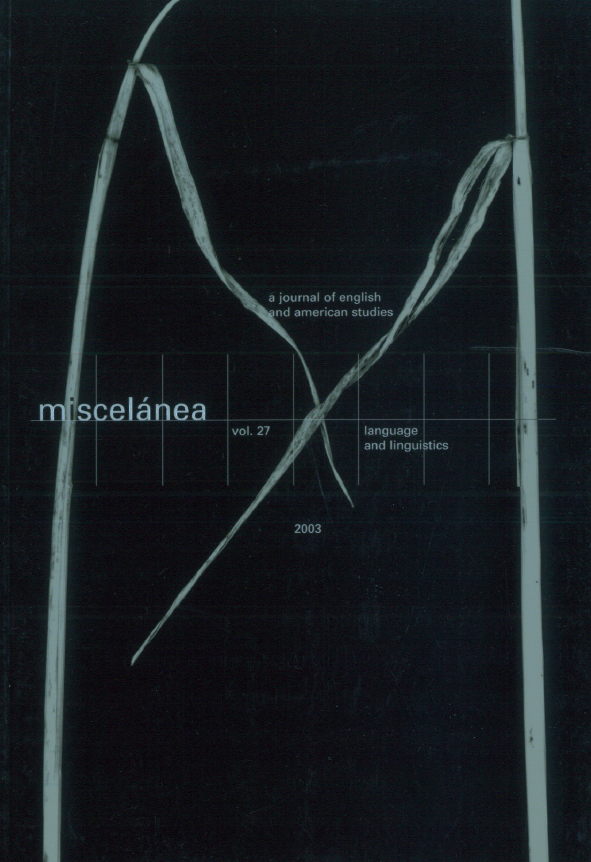Aspectos socioculturales en la fraseología de la lengua inglesa: Perspectivas de estudio
DOI:
https://doi.org/10.26754/ojs_misc/mj.200310402Palabras clave:
fraseología, aspectos socioculturales, lengua inglesa, perspectivas de estudio, categorizaciónResumen
La permeabilidad de la fraseología con respecto a los aspectos socioculturales que caracterizan a las lenguas es un hecho comúnmente admitido. La relación entre fraseología y claves socioculturales es especialmente estrecha y se manifiesta de muy distintas formas. De ahí que los lingüistas hayan dedicado sus esfuerzos a la observación de determinadas cuestiones más o menos particulares. Sin embargo, se echan de menos estudios que ofrezcan una visión global de las diferentes vías por las que se produce el contacto entre estas dos realidades. La sistematización de la ubicuidad de la realidad sociocultural en la fraseología no es una tarea sencilla, e implica la necesidad de considerar los ejes en torno a los que se produce esta relación. En este artículo proponemos una clasificación de las distintas perspectivas desde las que se puede acometer la relación entre fraseología y realidad sociocultural con referencia a la lengua inglesa.
Descargas
Referencias
ALEXANDER, Richard J. 1978. “Fixed expressions in English: A linguistic, psycholinguistic, sociolinguistic and didactic study” (Part 1). Anglistik und Englischunterricht 6: 171-188.
—. 1979. “Fixed expressions in English: A linguistic, psycholinguistic, sociolinguistic and didactic study” (Part 2). Anglistik und Englischunterricht 7: 181-202.
BARZ, Irmhild. 1995. “Idiolektale Aspekte der phraseologischen Variation”. En Lerchner, Gotthard, Marianne Schröder y Ulla Fix. (eds.). Chronologische, areale und situative Varietäten des Deutschen in der Sprachhistoriographie. Bern: Peter Lang: 345-356.
BURGER, Harald. 1996. “Zur Phraseologie des Schweizerhochdeutschen”. En Coronen, Jarmo. (ed.). Studien zur Phraseologie des Deutschen und des Finnischen. Bochum: Brockmeyer: 461-488.
—. 1998. “Helvetismen in der Phraseologie - Vorkommen und stilistische Funktionen”. En Hartmann, Dietrich. (ed.) Das geht auf keine Kuhhaut - Arbeitsfelder Phraseologie. Bochum: Brockmeyer: 49-80.
CORPAS PASTOR, Gloria. 1995. Un estudio paralelo de los sistemas fraseológicos del inglés y del español. Tesis doctoral. Málaga: Servicio de Publicaciones de la Universidad.
—. 1996. Manual de fraseología española. (Biblioteca Románica Hispánica. Manuales, 76). Madrid: Gredos.
—. 2001. “Corrientes actuales de la investigación fraseológica en Europa”. Euskera 46 (1): 21-49.
COULMAS, Florian. 1981a. Conversational Routine. Explorations in Standardized Communication Situations and Prepatterned Speech. The Hague: Mouton.
—. 1981b. Routine im Gespräch. Zur pragmatischen Fundierung der Idiomatik. Wiesbaden: Akademische Verlagsgesellschaft Athenaion.
DOBROVOL’SKIJ, Dimitrij. 2000. “La especificidad nacional y cultural en fraseología”. En Pamies Bertrán, Antonio y Juan de Dios Luque Durán. (eds.). Trabajos de lexicografía y fraseología contrastivas. Granada: Método Ediciones y Granada Lingvistica. Serie Collectae: 63-77.
FORMENT FERNÁNDEZ, María del Mar. 2001. “La variación fraseológica en el ámbito hispanohablante”. Ponencia presentada en el XXIV Curso de Lingüística Textual: Unidades Fraseológicas en español y en contraste con otras lenguas (alemán, catalán, francés, gallego, inglés, italiano). Universidad de Murcia, 12-22 de marzo de 2001.
GLÄSER, Rösemarie. 1986. Phraseologie der Englischen Sprache. Leipzig: VEB Verlag Enzyklopädie Leipzig.
—. 1999. “Indigenous idioms and phrases in Australian and New Zealand English”. En Carls, Uwe y Peter Lucko. (eds.). Form, Function, and Variation in English: Studies in honour of Klaus Hansen. Frankfurt am Main: Peter Lang: 155-168.
HANSEN, Klaus P. 1995. Kultur und Kulturwissenschaft. Tübingen: Franke Verlag.
KOIKE, Kazumi. 2001. “La variación fraseológica del español”. Disponible en <http://gamp.c.utokyo.ac.jp/~ueda/varilex/art/vx9-a3.pdf.>
LUQUE DURÁN, Juan de Dios y Francisco José MANJÓN POZAS. 1998. “Tipología léxica y tipología fraseológica: universales y particulares”. En Luque Durán, Juan de Dios y Antonio Pamies Bertrán. (eds.). Léxico y Fraseología. Granada: Granada Lingüística y Método Ediciones: 139-153. También disponible en Internet como “Claves culturales del diseño de las lenguas: fundamentos de tipología fraseológica”. En <http://elies.rediris.es/elies16/Claves.html>
MCCARTHY, Michael Y Ronald CARTER. 1995. Language as Discourse. Perspectives for Language Teaching. London and New York: Longman.
MENA MARTÍNEZ, Florentina. 2002. La desautomatización de las paremias inglesas por sustitución: un estudio cognitivo. Tesis doctoral. Universidad de Murcia: Servicio de Publicaciones.
—. 2003. “En torno al concepto de desautomatización”. Tonos digital 5. En <http://www.um.es/tonosdigital/>
MIEDER, Wolfgang y Anna TÓTHNÉ LITOVKINA. 1999. Twisted Wisdom. Modern anti-proverbs. Vermont: Queen City Printers.
MOON, Rosamund. 1998. Fixed Expressions and Idioms in English: A corpus-based Approach. Oxford: Clarendon Press.
NACISCIONE, Anita. 2001. Phraseological units in discourse: Towards Applied Stylistics. Riga: Latvian Academy of Culture.
PIIRAINEN, Elizabeth. 2000. Phraseologie der westmünsterländischen Mundart. Teil I: Semantische, kulturelle und pragmatische Aspekte dialektaler Phraeologismen (phraseologie und Parömiologie 2). Baltmannsweiler: Schneider Verlag Hohengehren.
SUMMERS, Della. (ed.). 1992. Longman Dictionary of English Language and Culture. Londres: Longman.
TELIYA, VEROKINA BRAGINA, Elena NATALYA OPARINA E Irina SANDOMIRSKAYA. 1998. “Phraseology as a Language of Culture: Its Role in the Representation of a Cultural Mentality”. En P. Cowie, Anthony. (ed.). Phraseology. Theory, Analysis and Applications. Oxford: Oxford U. P.: 55-75.
ZULUAGA OSPINA, Alberto. 2001. “Fraseología y conciencia social en América latina”. Euskera 46 (1): 51-72.
Descargas
Publicado
Número
Sección
Licencia
Derechos de autor 2003 Florentina Mena Martínez, Piedad Fernández Toledo

Esta obra está bajo una licencia internacional Creative Commons Atribución-NoComercial 4.0.


